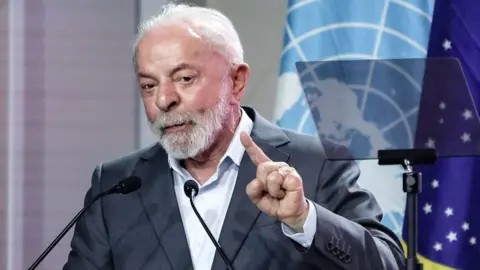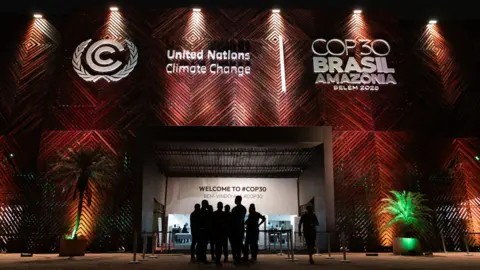Georgina RannardClimate and Science Reporter, Belem, Brazil
 Shutterstock
ShutterstockThe world must “defeat” climate denial and fight fake news, Brazilian President Luiz Inacio Lula da Silva said at the opening of UN climate talks.
Speaking ahead of COP30, President Lula again made thinly veiled references to President Donald Trump, who in September called climate change a “scam”.
Two weeks of talks began Monday in the lush Brazilian city of Belem, located on the edge of the Amazon rainforest.
They come against a tense political backdrop, and the US has not sent senior officials.
On Monday, thousands of delegates poured into the COP site at a heavily air-conditioned former airfield, some arriving from shipping containers and cruise ships moored along the riverbank.
Members of the indigenous Guajajara people, dressed in traditional dress, performed a welcoming song and dance for the assembled diplomats.
Speaking at the conference, President Lula said that “COP30 will be the COP of truth” in an era of “fake news and distortion of facts” and “rejection of scientific evidence.”
Without naming President Trump, President Lula continued: “They control the algorithms, they spread hatred and they spread fear.”
“It's time to deal a new defeat to the deniers,” he said.
 Reuters
ReutersSince President Trump took office in January, he has pledged to invest heavily in fossil fuels, saying it would bring greater economic prosperity to the United States.
His administration has eliminated more than $13 billion in renewable energy funding and is taking steps to open more U.S. territory to oil and gas exploration.
This puts the country at odds with most countries that are still committed to reducing greenhouse gas emissions and investing in green energy.
 UNFCCC
UNFCCCAgainst this backdrop, the COP negotiations are in a difficult position as countries seek to make progress on climate change without the participation of the world's largest economy.
Some delegates fear the US may yet decide to send officials to derail the negotiations. Other environmental talks have collapsed this year due to U.S. pressure that some participants called “bully tactics.”
Addressing officials in Belém, UN climate chief Simon Still struck an initially optimistic tone. He said significant progress had been made in the past decade in reducing emissions of planet-warming gases.
But then he took on board the “squabbles” between countries.
“No country among you can afford this as climate disasters reduce GDP by double digits,” he said.
Brazil wants to use its presidency of the negotiations to ensure progress on key promises made in previous years.
This includes eliminating planet-warming fossil fuels, funding developing countries on the front lines of climate change, and protecting nature.
President Lula's centerpiece is a fund called the Tropical Forest Forever Facility (TFFF), which Brazil hopes will raise $125 billion to protect tropical forests around the world.
Fundraising started slowly. Last week, British Prime Minister Keir Starmer announced at the last minute that the UK would not contribute public money.
But on Monday, UK climate envoy Rachel Kyte told BBC News the fund was a “brilliant idea” and that the UK would “invest at some point”.
After a struggle, the countries finally agreed on the agenda for the conference on Monday.
It promises to look at whether countries can still work to keep global temperature rise to 1.5C above pre-industrial levels.
Groups on the front lines of the fight against climate change, including a coalition called the Alliance of Small Island States (AOSIS), which mainly represents Caribbean and Pacific countries, insisted that the talks are aimed at achieving a long-standing goal.
In recent weeks, even the UN has said it recognizes that exceeding these temperatures is “inevitable.”
Last week, UN Secretary-General Antonio Guterres told leaders in Belém that failure to limit global temperature rise to 1.5C was a “moral failure and deadly negligence.”
Additional reporting by Esme Stallard








